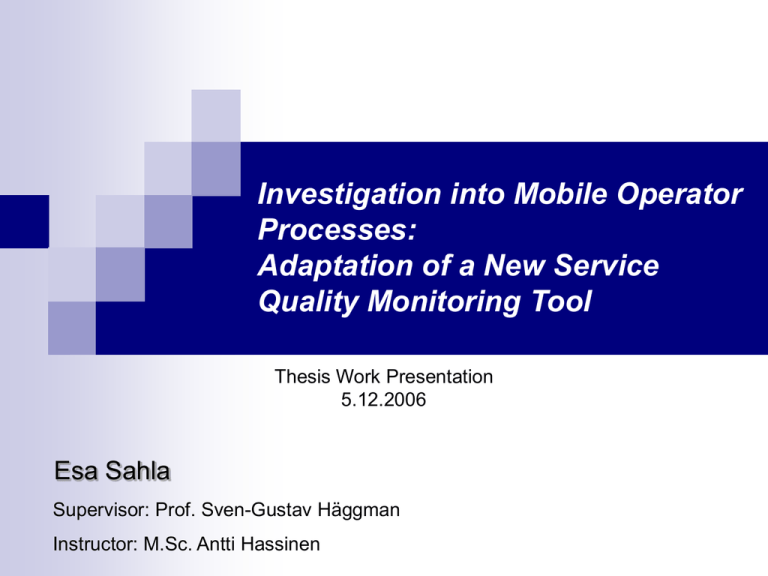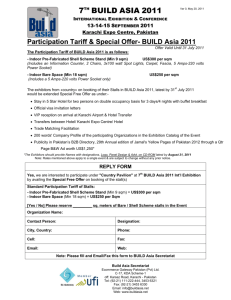Investigation into Mobile Operator Processes: Adaptation of a New Service Quality Monitoring Tool
advertisement

Investigation into Mobile Operator Processes: Adaptation of a New Service Quality Monitoring Tool Thesis Work Presentation 5.12.2006 Esa Sahla Supervisor: Prof. Sven-Gustav Häggman Instructor: M.Sc. Antti Hassinen Contents Introduction to the study 1. • Background, research problem, research methods Service Quality in Mobile Networks 2. • Motivation for QoS, network QoS management tools Service Quality Manager (SQM) 4. SQM - Maintenance and Development 5. Conclusions 3. Background New mobile technologies (e.g. UMTS) introduce a massive amount of new mobile services The strain on the operator’s network increases and the probability of network and service related problems increases along with it New service centered network management tools are a necessity if the operators wish to effectively control this development and thus provide an adequate level of service quality to their customers TeliaSonera Finland was interested in identifying the effectiveness of their service quality management process and study the possibility of adapting a new quality monitoring tool into the process Objectives 1. To give a comprehensive view of the current situation of network performance and fault monitoring at TeliaSonera Finland. 2. Analyze the process of adapting a new network monitoring tool, the Nokia NetAct Service Quality Manager, at TeliaSonera Finland 3. Identify the main user groups for the said tool. Research Methods Literature study Various specifications (ETSI, ITU, 3GPP) Related books and publications Practical part Interviews with personnel at TeliaSonera and with equipment vendor representatives Study of in-house and equipment vendor documents Attending meetings within TeliaSonera on service quality management and SQM related issues Contents Introduction to the study 1. • Background, research problem, research methods Service Quality in Mobile Networks 2. • Motivation for QoS, network QoS management tools Service Quality Manager (SQM) 4. SQM - Maintenance and Development 5. Conclusions 3. Motivation for QoS mechanisms New mobile communication technologies (e.g. UMTS) have strict QoS requirements Customer satisfaction is closely related to the service quality provided by the network Along with e.g. pricing and network availability With good QoS mechanisms, scarce radio resources can be utilized more efficiently For example, real-time services (such as video telephony) need performance guarantees Increased cost efficiency through resource optimization based on services’ QoS requirements Increase in ROI Ultimately, effective QoS mechanisms ensure a competitive advantage Performance requirements • 3G QoS traffic classes: Traffic class Conversational Streaming Interactive Background Characteristics Conversational pattern (stringent and low delay) Preserve time relation between information entities of the stream. Request-response pattern. Preserve payload content. Destination is not expecting the data within a certain time. Preserve payload content. Example application Speech Video calls Real-time streaming video Web browsing E-mail File downloading Operator’s PoV Demanding • Delay • Jitter Demanding • Bit rate • Jitter Tolerant • Delay and bit rate may vary • Integrity Easiest • Delay and bit rate may vary • Integrity Data sources for Service Quality Management Customer complaints Field measurements Only large numbers signify a clear fault The fault has already affected the customer Used to establish end-to-end service quality experienced by the end-user Stationary hot-spot tests and drive tests Competitor benchmarking Network elements Main source of data for network monitoring tools Network elements: counters and interfaces Network performance monitoring Field measurements Network optimization Customer complaints Network Management Tools New mobile network management tools should: be able to identify possible error conditions and according corrective actions pro-actively take preventive measures on impairments that could reduce customer satisfaction reduce mobile operators operational expenses The network management tools employed at TeliaSonera were analyzed to determine how well they fulfill the above criteria Network Management Tools The analysis found that the network management process clearly lacked an efficient tool for efficient, realtime network service quality monitoring Especially for 3G RAN The full scale implementation of a new service quality monitoring tool was thus justified Nokia NetActTM Service Quality Manager (SQM) Contents Introduction to the study 1. • Background, research problem, research methods Service Quality in Mobile Networks 2. • Motivation for QoS, network QoS management tools Service Quality Manager (SQM) 4. SQM - Maintenance and Development 5. Conclusions 3. SQM The Nokia NetActTM Service Quality Manager is a service quality monitoring platform Designed to work with both 2G and 3G systems Multi-vendor support Real-time monitoring Enables operators to monitor the state of the services provided by their network (rather than only element status) Correlates measurement data from various data sources for more accurate fault determination Pre-emptive fault detection Fault impact calculation based on end-user perspective SQM: Creating a new level for monitoring network performance Service Quality Manager Integration of information received from the network for detailed service quality analysis Service level Alarm and fault systems DC5000 Traffic monitoring system Multi-vendor integration Network level Fault managements QoS Management •Counters •KPIs Real-time traffic measurements Other measurements Network and service infrastructure Other systems User Groups at TeliaSonera Finland A part of the thesis focused on identifying the main user groups for the SQM solution The main users can be roughly divided into: Network maintenance System planning User Group: Network maintenance Lacking an efficient, real-time service monitoring tool for 3G systems Swamped with too many systems and tools which to monitor No tool for sleeping cell monitoring With SQM: Possibility for real-time service quality monitoring and automatic fault analysis for effective root-cause analysis Simplify the management of complex 3G network Automatic correlation of element data and fault information Dead cell detection Overall streamlining of the network maintenance process (see: figure) Streamlined network maintenance with SQM Fault Monitoring Creation of a trouble ticket Trouble ticket system Relevant reports Monitor SQM Relevant alarms History DC5000 (Trend analysis) Reporting Service Quality trends Traffic data Test results Element alarms Testing equipment Performance data Network element data Traffic analyzer Network measurement data sources User group: System planning Benefits gained with SQM: More effective monitoring of element updates Especially, correlating network measurements with element update status Easier determination of network problems when fault effecting a larger part of network And the benefits explained previously Contents Introduction to the study 1. • Background, research problem, research methods Service Quality in Mobile Networks 2. • Motivation for QoS, network QoS management tools Service Quality Manager (SQM) 4. SQM - Maintenance and Development 5. Conclusions 3. Background SQM wasn’t ready “out-of-the-box” Need for customization SQM should be available for all areas of mobile network management Different access methods contemplated Web-access for ease of use and with limited functionality Direct connection to the system for advanced users Custom measurements needed to be implemented Various threshold values and performance indicator formulas Dead cell monitoring SQM steering group formed to oversee future development on the system SQM Maintenance Process at TeliaSonera Supervises Steering groups Sends performance data Nokia NetAct SQM New feature testing Quality team Help request in trouble cases. Specifications for new alarm monitoring rules RAM team Parameter team Nokia Training and instructions Specifications for new KPI or KQI values Gives feedback on the systems’ state to New specification work required Provides new alarm monitoring implementation instructions System maintenance Network element software upgrade projects, etc. New Newfeatures featuresto existing systems Need for new performance indicators Maintenance and new feature implementation Process evaluation The SQM integration and development process itself was analyzed in this thesis using the following criteria: Trial period analysis Software vendor reliability Total cost Tailoring possibilities Integration possibilities Training possibilities Multiplatform support Results of this analysis mainly used to measure the successfulness of the adaptation process This, in turn, would be used to decide whether changes in similar projects are needed in the future Contents Introduction to the study 1. • Background, research problem, research methods Service Quality in Mobile Networks 2. • Motivation for QoS, network QoS management tools Service Quality Manager (SQM) 4. SQM Integration 5. Conclusions 3. Conclusions Next generation mobile networks require the operators to have more versatile tools to manage the various services provided by the network The system should also make the operation and management of the network and its resources efficient and effective Analysis of TeliaSonera’s mobile network management processes concluded that there was a clear need for such a tool Service Quality Manager fills this need The analysis was also done to establish a regular practice within the company to analyze their network management practices in terms of service quality management Conclusions The analysis identified two main user groups Adaptation process evaluation revealed defects in the process: For example, end-user needs should be identified sooner in the process so as to speed up the development process As the field of study presented in this thesis is constantly under change, it is evident that some process descriptions presented will not be topical for long In light of some issues identified in the analysis, procurement of an additional performance monitoring tool was proposed Especially from the operator’s stand-point All things considered, the objectives of the thesis were reached No further study on the subject needed as such What remains is the final steps of integrating the system into the operator’s processes Thank you



